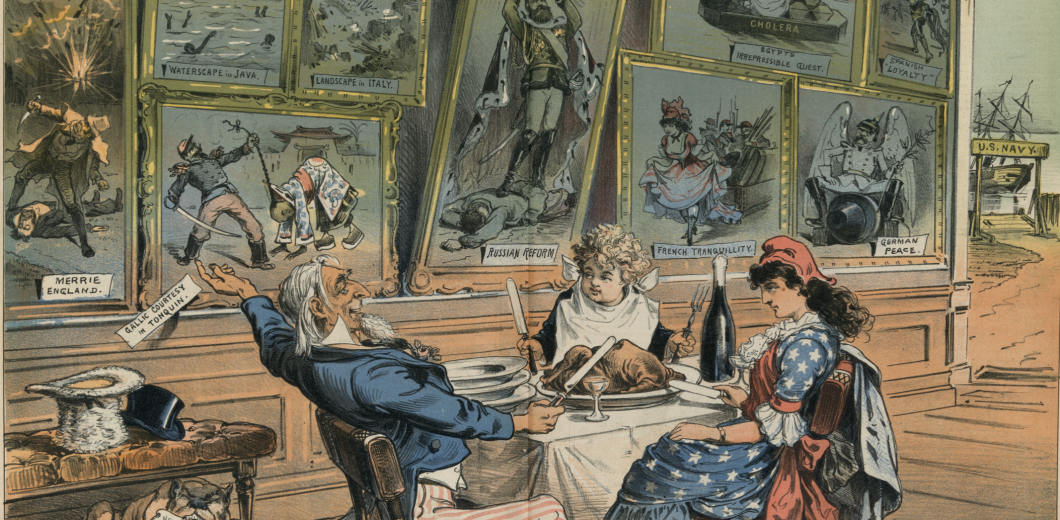In an age of demagoguery, judges and justices—members of a highly credentialed elite dealing with complex questions—are perfect targets.
The Practice of Thanksgiving in Troubled Times
Thanksgiving is the American harvest festival, an occasion to celebrate the bounty of the year we now begin to lay to rest. It is also the time to express our gratitude for what didn’t go worse. In this year of our collective loathing and well-justified fear, it might seem that we do not have much to be thankful for. But against the prevailing spirit of the times, I offer in this essay humble encouragements to all who feel with me that this is precisely the year in which the sentiment of gratitude is what is needed most. Let 2020 be the year America rediscovers the reverent art of Thanksgiving in the midst of troubled times.
Our Present
We are indeed in uncertain yet certainly troubling territory. The election, while over, has continued to divide the nation, because the sitting president has repeatedly refused to concede the race he lost. Even worse, President Trump has insisted upon allegations of nationwide voter fraud so fabulous that even his own lawyers will not allege them in court for fear of professional consequences. Embracing overt conspiracies as many Trump supporters now have could plausibly brand the Republican Party with a certain reputation for unseriousness—to put it charitably—that will be hard to shake amongst the more moderate, decisive middle of the American electorate. The median voter does not believe Communist dark money or Venezuelan server hacks delivered Joe Biden the White House. And then there is the problem of Trump’s base, many of whom are now convinced that elections in America are rigged by invidious and invincible elites.
Are we fit enough psychologically to keep our addictions and our emotions in check to the degree required for competent self-government?
Then there is the incoming administration. By all indications so far it seems our next president will surround himself with longtime pols, Acela corridor insiders, and proven Biden loyalists. These people are not “the radical left,” though it remains to be seen how they will manage pressures from actual leftists—no doubt a core constituency within the Democratic Party going forward, and one that will make many strong demands. Rather the signals from team Biden—when combined with the likelihood of a Republican Senate, and the reality of a conservative Court—suggest more of the establishment same: lots of spending and government growth, primarily through the administrative state. But no full-on Green New Deal, no socialized medicine, no mass confiscation of AR-15s—not with this institutional constellation. For American conservatives this is no Reaganesque dreamscape, but the situation in reality is a lot better than Trumpian alarmism about impending leftist tyranny would suggest.
Our problems extend beyond the political, of course. Ever present in the background of this year’s other crises, the coronavirus remains. In fact, this week we are told it surges. Day after day cities, counties, states, and the nation break recently set records for cases and fatalities. Schools and businesses prepare to close again if they have not already (often with an unfortunate disregard for the relevant evidence, especially in the case of schools). For many, of course, the virus poses little direct danger. But for our society the phenomenal disruptions of Covid-19 are deadly serious. Headed, perhaps, into a winter of viral darkness, we are a nation distanced and isolated; radicalized and anxious; polarized and alone. Neighbors distrust neighbors and friends abandon—or cancel, or simply don’t have the time of day for—friends. Purging one another might seem the surest path to associational purity or uninterrupted, isolative peace, but I suspect we are to discover in times ahead that it was a poor recipe for any sort of flourishing.
Intellectual Guidance
Two recent books provide us with some much-needed epistemic illumination this Thanksgiving. The first is Joshua Mitchell’s American Awakening, which tells of an America suffering from three major pathologies: identity politics (the obvious cancer), and addiction and bipolarity—much more subtle psychological ills. Addiction habituates us to distraction, keeping our attention away from where it ought to be (on goods such as our families, communities, and vocational development). Bipolarity—a product, according to Mitchell, of the simultaneous freedom and servitude of global liberal management society—routinizes Manichean mood swings, exposing us to the perils of emotional volatility in a way that makes a stable life impossible. Each of these presents a serious obstacle to what Mitchell suggests is the much-needed remedy of “liberal competency.” Frequent readers of Law & Liberty are no strangers to the strongest criticisms of identity politics, which Mitchell certainly offers. But his most innovative and probing contributions to this moment undoubtedly come in the book’s back end. Even if we can put a lid on the transformative ambitions of the woke, we still face serious challenges to self-rule stemming from the algorithmically curated nexus of our technologies and ourselves, which scripts our lives for us. Are we fit enough psychologically to keep our addictions and our emotions in check to the degree required for competent self-government?
A second book that promises some measure of civilizational orientation this Thanksgiving is Donald J. Devine’s The Enduring Tension: Capitalism and the Moral Order. Concerned with the rise of socialism on the left and to a lesser but still notable extent, state-cozy capitalism on the populist right, Devine conducts a deep dive into criticisms of, and then justifications for, the “capitalist” system of free enterprise. Chock full of interesting observations and citations on a wide range of topics, from Devine’s time in government administration to the horizons of contemporary particle physics, The Enduring Tension is a superb sourcebook for the start of this decade—no doubt a decisive one for the cause of human liberty. On that score, The Enduring Tension ends with a note of warning:
The moral assumptions of the Western traditional mythos, in which individuals have been created free and equal, are indispensable to legitimizing a pluralist, federalist, traditionalist, capitalist society with free markets and localized powers under a limited central state—a society where liberty and order coexist in a creative tension. If its legitimizing source is forgotten or denied, one can assume, with Schumpeter, that the civilization will likely fail.
What emerges from the work is a portrait of what both undermines and sustains freedom, from the sciences to the major faith traditions. Pope Francis is a guiding critic of capitalism throughout. His practically humanitarian ideology, which sits in constant judgement of markets without a thought or public word given to how capitalism improves the lives of the world’s truly poor, serves as a sort of foil for Devine’s own positive case for the superiority of ordered liberty over more coercive modes of political economy. The upshot of the book is that we dance as a civilization—perhaps less confident in our footing than ever—between the perilous excesses of libertine anarchy and statist control. Our world is the product of the enduring tension between these forces, and is sustained only by keeping them in check. Let one overpower, as many would have it, and the America we love ceases to exist.
Which brings us back to Joshua Mitchell. A recurring metaphor in his latest work concerns the ideas of the supplement and the meal. “Meals” are what actually nourish us and give us life, the sustaining goods of wholesome food, regular exercise, face-to-face interaction with friends and family, religious practice, and studious encounters with truth. “Supplements” are those things that are either supposed to augment or stand in for things in the “meal” category: fast food, social media, on-demand entertainments, drugs, pornography, ideology, and so forth. If we are honest, few of us can say that we avoid all supplements entirely (there are many more than I listed), yet we all know that what we truly long for is a bundle of goods that are meals. Those are where we are filled up, energized, and given new life. Yet we continue to demand supplements because they are easy, cost us little, and make virtually no demands on us as moral persons.
Making Meals
Thanksgiving is a meal, as well as a quintessential example of one of Mitchell’s “liberal competencies”—something we must be good at in order to govern ourselves with dignity and grace. It is a cornerstone of the American moral order, a solemn yet celebratory feast of gratitude for what we have and what we have not yet had taken away. It is a social ritual, centered around an actual meal yet involving many other ones: deep conversation, cooking, family care, polite small talk, gift-giving, decoration, and so on. This year we know these things each mean more than we once thought they did.
Thanksgiving 2020 catches us amidst a crisis of competence throughout the American regime. On some level only God can spare us worse, but as ever part of that work falls on us.
Thanksgiving gives us a chance to be our best selves even as it can tempt the worst in us when the conversation takes a certain turn. This year the temptation will be perhaps greater than ever to let politics and current controversies consume us and spoil our gatherings. (Perhaps religion is for once a safer conversational bet?) Our unique cultural circumstances, if not impoverishment, this year commends certain disciplines. For the sake of civic peace and the preservation of domestic tranquility, it is imperative that those aspiring to liberal competence choose to exercise virtue this holiday season, starting today within the little platoons of our families gathered around the dinner table.
I suggest that the three virtues most needed this Thanksgiving are restraint, respect, and love. Restraint because, with everything so politicized and contentious these days, many people are a hair-trigger away from a bout of performative outrage. While you might not be able to prevent such an eruption, I encourage you to do what you can to not invite one. At Thanksgiving, peace should take precedence over the insistence on our ultimate correctness. This might mean we redirect ourselves to doing rather than talking. In practice, it is easier to renew respect for one another while engaged in work or play; we can bond over football, the act of making the Thanksgiving meal, or playing games with family. We revive our family bonds here in doing, not in debating.
Respect is necessary because we need to express to others—especially estranged friends and loved ones—that we are not going to give up on them just because they have let some form of contemporary craziness get to their head. Engage such an afflicted person as a whole person, not just on the level of their angry or shallow ideas. Hopefully, this whole person is who they can be on the other side of this saddening series of crises. But even if that proves a bridge too far, your respect is unlikely to make anyone’s situation worse, including your own.
Finally, the greatest of these, love. While the emotion undoubtedly has chemical roots in our pro-bonding animal brain, as an elective virtue love is the Biblical tradition’s enduring gift to our civilization and one of the most difficult virtues of our moral inheritance to actually practice. Our culture is consumed with contempt and animosity. Our lives are poorer as a result. If we wish to avert genuine civilizational catastrophe—of the sort we could imagine in a landscape totally devoid of practitioners of love—then we must become such practitioners, and in earnest. We can begin to do this by forgiving one another for those things that in the past drove us to contempt. Last year we could still afford to let our differences get the better of us and to knowingly dive headlong into merciless ad hominem battles of political, intellectual, and moral superiority. This year, I am less convinced.
Thanksgiving 2020 catches us amidst a crisis of competence throughout the American regime. On some level only God can spare us worse, but as ever part of that work falls on us. We require a patient reknitting of our social fabric with the fine yarns of restraint, respect, and love. This holiday presents us with a fine opportunity to start.



